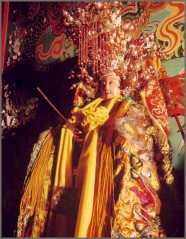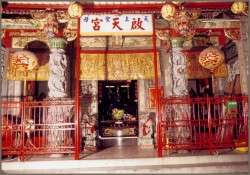 |
 |

Founding Year : 1851, 1861
God Worshipped : Tien-shang Shen-mu (Birth date : March 23)
Religion : Popular belief
Relic Classification : Not yet classified
Location : No. 27, Lane 253, Kwangchow St, Wanhua District, Taipei
Phone : (02) 23084598
|
|
|
|
|

The Temple is also called "Liao-kuan Matsu Miao" because it worships Tien-shang Shen-mu and was formerly located at "Liao-kuan-kou Street" , i.e. the present boundary between Kwangchow Street and Huan-ho South Road. The phrase "Liau-kuan" means a "timber firm." According to the legend, during l851-1861, there was a ship from mainland China sailing to Moun-gar to do timber transaction. Upon its return-bound sail, the ship couldn't sail forward; then it sailed back to Moun-gar. After asking the god, it was discovered that the Matsu, worshipped on the ship, wanted to land and stay in Moun-gar to be worshipped by the local people. Then, Huang Lu , owner of the Liao-kuan, expressed his wish to welcome the statue of Goddess Matsu to be privately worshipped in the main hall of his house. After that, Huang Lu became wealthy and moved to the newly-built "Ta-chu" (big mansion),but Matsu didn't want to be moved to the mansion. Then Matsu became worshipped by the general public at a temple, which the Moun-gar people called"Liao-kuan Matsu Miao,"' i.e.the present"Chi-tien Kong'" after undergoing renovation in 1930 and in 1966.
|

|

Tien-shang Shen-mu in Taiwan is generally called Matsu. Like Guanyin Bodhisattva, Matsu is the god most worshipped and revered by people in Taiwan.
Matsu's last name was Lin and her family name was Mo . She was born on a small island called Mei-chow, Putien County, Fukien . Since born till a month old, she never cried; therefore, her parents named her Mo (meaning "silent" or"mute"). While a child, she was gifted and at the age of five she could recite Guanyin sutra. Since childhood, she had observed Buddhist rites. According to the record, Matsu's mother ate the flower which Guanyin gave her that she conceived Matsu. When Matsu was born, the room was very fragrant. From this event, it's clear that Matsu has a close connection with Guanyin Bodhisattva. In the Ming dynasty, Admiral Zheng-he sailed to the Western ocean with smooth wind, so then the government conferred the name "Tien-fei" to Matsu. In the Ching dynasty, the emissary voyaged to Ryukyu and the military and civil officials crossed the strait to Taiwan with fair wind, so the Ching government called Matsu "Tien-hou" (meaning "Heavely Queen"). Up to now, Matsu is very popular with people in Fukien, China's seacoast, southern Japan, Taiwan, and southeast Asia.
|
|
|
|